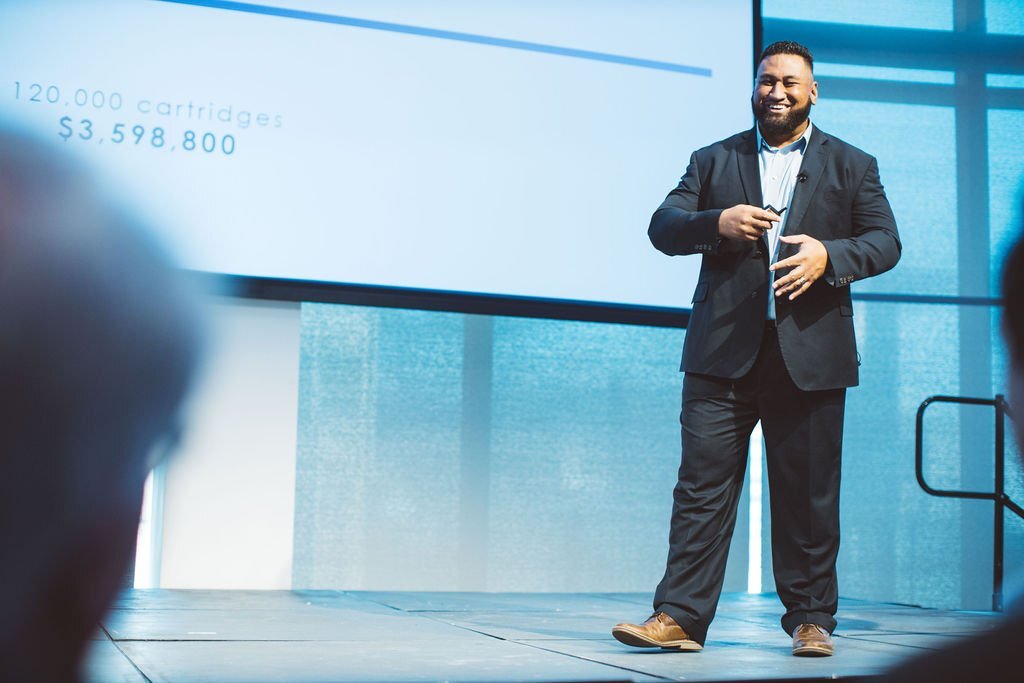Boise Entrepreneur Week comes down to the wire
By Sharon Fisher
While Boise Entrepreneur Week (BEW) had to make the difficult decision earlier this year to change the live presentation to a largely virtual one, there’s still plenty of interest and attractions in the three-day event to educate and celebrate Idaho’s startup community.
“Obviously, an in-person year has different trajectories,” said Tiam Rastegar, BEW co-chair and executive director of the Trailhead coworking space. As of early October, there were already more than 400 registrants. “That’s not too shabby for a virtual event,” he said.
2019 Pitch Competition winner Rob Polecki of Washie. Photo courtesy Boise Entrepreneur Week.
Some of the speakers come from outside the entrepreneur community and represent the importance of Idaho’s startup community to the Boise and Idaho economy, said Nick Crabbs, BEW co-chair and partner and chief community officer for VYNYL. “Gov. Brad Little is going to do a session about economic recovery with Jeff Newgard, president and CEO of the Bank of Idaho,” he said. Boise Mayor Lauren McLean will give the opening keynote, focusing on the economic recovery, the city’s outlook, and its support of Boise Entrepreneur Week, Rastegar said.
But the majority of the speakers will be from Idaho’s startup trenches.
“We really tried to cover the big topics that are relevant to entrepreneurs to function,” Rastegar said. “Everything revolves around access to funding, talent, and markets, and every piece of content is keyed into one of those things. There are several talks about lessons learned and how entrepreneurs got where they are, accelerators, trials and tribulations, and content from entrepreneurs about their lessons learned.”
In particular, a number of winners from past pitch competitions will be speaking, as well as other local companies that have had big wins, such as Todd Krautkremer, chief marketing officer from Cradlepoint, speaking about the company’s acquisition by multinational telecommunications giant Ericsson.
Notably, this year’s speaker list has an emphasis on diversity, with not only two sessions geared toward women entrepreneurs but several female founders talking about their companies, including Chillow’s Alexis Rankin, Lumineye’s Megan Lacy, FiftyFlowers’ Liza Roeser, Snacktivist’s Joni Kindwall-Moore, Simply Eloped’s Janessa White, and Orchestra Provisions’ Kate Stoddard. “We’ve been paying attention as we’ve been planning for the event,” Rastegar said.
Other topics include getting technology to market, growing consumer packaged good startups, Idaho’s cleantech business, several presentations on cybersecurity, Bitcoin, venture capital and acquisitions, recruitment, child care, crowdfunding, intellectual property, exporting, biodiagnostics, selling to the government, and B corporations.
“Everything revolves around access to funding, talent, and markets, and every piece of content is keyed into one of those things. There are several talks about lessons learned and how entrepreneurs got where they are, accelerators, trials and tribulations, and content from entrepreneurs about their lessons learned.”
— TIAM RASTEGAR, BEW CO-CHAIR + EXEC. DIRECTOR OF TRAILHEAD
Youth involvement
In addition to the other pitch competitions, getting youth involved was also a major focus, with this year being the second to offer the Youth Innovation Challenge after prototyping it last year, Rastegar said. The challenge features tracks for both high school and collegiate entrants, with high schools winning $3,000 scholarships and $1,500 for their schools, and college students winning $3,000 cash. “We’re getting lots of participation from the private business side,” he added such as the Science, Technology, Engineering and Math (STEM) Action Center, Micron, the University of Idaho, and Wells Fargo Bank.
The way the challenge works is the private enterprises provide “problem statements” and students have from now until November 19 to pick one of the problems and produce an eight- to 12-minute video on how they would go about solving the problem, Rastegar said. Winning is based on how clearly the team communicates its solution, how inventive the solution is, and how accomplishable the solution is, he said.
Last year’s challenge included problems such as solutions for Boise’s housing crunch, reducing the use of single-use plastic, what to do with medical data, shipping food – particularly refrigerated food – more efficiently, and how to get weekend food kits to kids on the school lunch program without it feeling like a handout, Rastegar said. The winning team, Meridian Technical Charter High School, picked the first problem, and its solution was to remove red tape and allow the development of container homes and tiny houses, he said.
Finally, the event will still have one day of in-person events, with the Investors Choice conference and a block party on Wednesday, Crabbs said.


